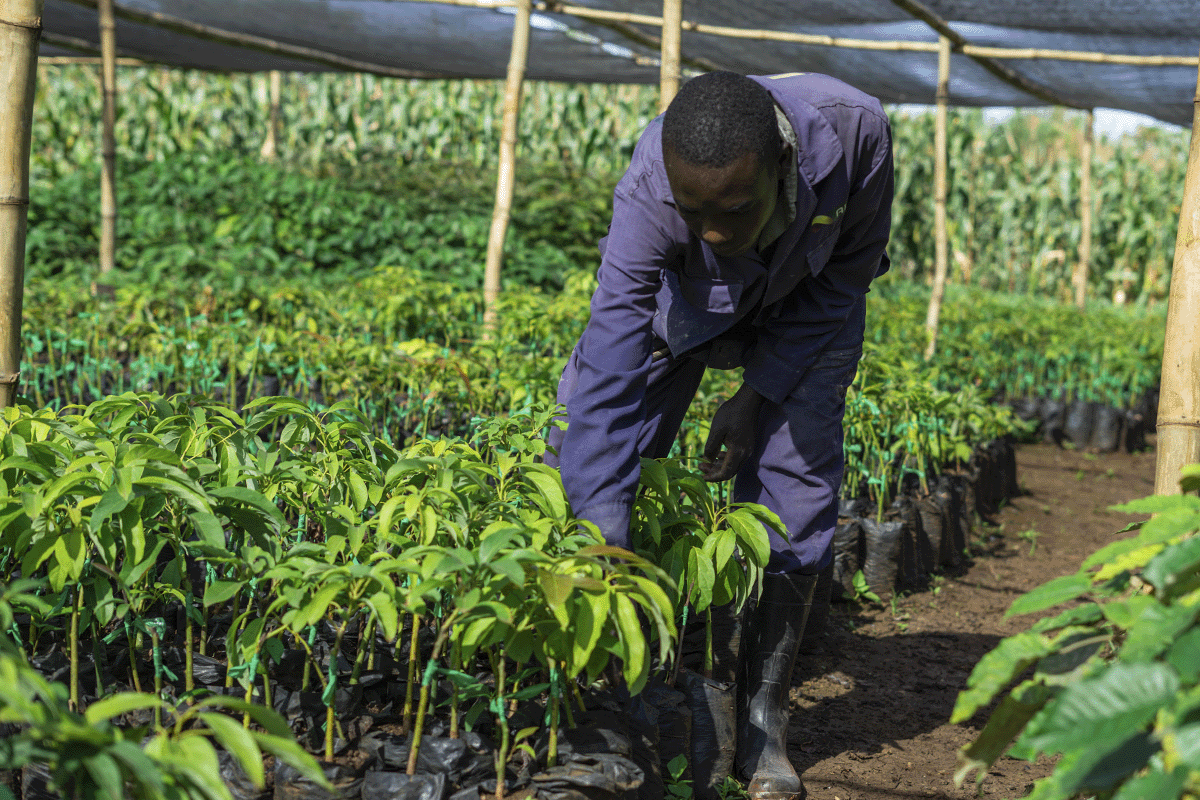Sustainability in business has become more than just a buzzword—it's a critical factor in driving success, improving financial performance, and gaining public support. In today's world, investors use Environmental, Social, and Governance (ESG) metrics to make informed decisions, and companies that embrace sustainability find themselves with a shared value opportunity. The negative impact of unsustainable practices on the environment is undeniable, and with increasing regulatory pressure, the need for sustainable practices has never been more pressing.
 A tree with ripe avocados - part of the Sawa Afforestation Project, DGB.
A tree with ripe avocados - part of the Sawa Afforestation Project, DGB.
Why is becoming sustainable important?
Sustainability is not just a choice; it's a critical factor that can make or break a business. Embracing sustainability is a strategic move that drives business success, improves financial performance, and garners essential public support. Today's investors evaluate companies using ESG metrics, making sustainable practices a magnet for funding.
A shared value opportunity emerges when companies align their objectives with sustainable practices, demonstrating a commitment to positive societal and environmental impacts. Moreover, the negative consequences of unsustainable practices on the environment are undeniable, and the regulatory pressure for businesses to become sustainable is intensifying.
Benefits of business sustainability
Business sustainability goes beyond short-term gains. It offers many other benefits:
- Long-term viability: Embracing sustainability ensures that your business remains resilient and adaptable, capable of weathering environmental, regulatory, and societal changes.
- Cost savings: Sustainable practices lead to efficient resource and energy use, reducing waste, and cutting down on unnecessary expenses. This includes lower utility bills and potential tax incentives for environmentally-friendly initiatives.
- Investor attraction: Sustainability is a magnet for socially-conscious and ESG-focused investors who recognise the value of responsible business practices. It can give your company a competitive edge in attracting funding.
- Accelerated growth: Sustainable businesses often experience faster growth due to increased customer loyalty, positive brand reputation, cost savings, employee retention, and a strong alignment with the values of a growing environmentally-conscious consumer base.
- Social benefits: By improving the environment and addressing societal needs, sustainable businesses create positive social impacts, contributing to community wellbeing.
- Environmental impact: Your commitment to sustainability directly contributes to reducing the negative impact of business operations on the environment, playing a crucial role in conserving natural resources and preserving ecosystems.
Read more: The power of sustainability: Why investing in sustainability drives faster company growth
 A woman cooking in an energy-efficient cookstove - part of the Hongera Energy Efficient Cookstoves Project, DGB.
A woman cooking in an energy-efficient cookstove - part of the Hongera Energy Efficient Cookstoves Project, DGB.
The 3 pillars of sustainability
In the realm of business sustainability, three crucial pillars exist: environmental, social, and governance (also called the economic pillar). These pillars focus on different aspects—environmental sustainability conserves natural resources and maintains life support systems, social sustainability promotes human wellbeing, and economic sustainability ensures a viable business model. By balancing these three pillars, businesses can create a comprehensive and effective sustainability strategy.
Read more: The 3 pillars of corporate sustainability
How to create a more sustainable business strategy
Creating a sustainable business strategy is a pivotal step in not only ensuring the long-term success of your company but also making a positive impact on the environment and society. This process involves a series of strategic actions, starting with assessing the problem and defining clear objectives. By understanding your sustainability priorities, aligning with a meaningful mission, crafting a strategy that incorporates the triple bottom line, and effectively implementing and evaluating your efforts, you can build a sustainable business that thrives in the modern marketplace.
 A man working in a tree nursery - part of the Sawa Afforestation Project, DGB.
A man working in a tree nursery - part of the Sawa Afforestation Project, DGB.
1. Assess the problem and define objectives
Assessing the problem and defining objectives is the crucial initial phase in building a more sustainable business strategy. It's the foundation upon which your entire sustainability framework will rest. By evaluating key aspects such as waste generation, energy usage, company culture, hiring practices, your target audience, and community impact, you gain insights into where sustainability can have the most significant impact. Setting Specific, Measurable, Achievable, Relevant, and Time-bound (SMART) goals is essential to guide your efforts effectively, ensuring that your sustainability strategy is focused, achievable, and measurable.
Read more: Reduce, reuse, recycle: 7 ways for businesses to reduce waste
2. Establish your mission
A well-defined mission statement is essential for a sustainable business strategy. It serves as the guiding force that shapes your company's purpose, values, and objectives. Effective mission statements, exemplified by companies like Warby Parker, Patagonia, and DGB Group, resonate with both employees and customers. Such mission statements should evolve as the company grows, maintaining alignment with objectives and reflecting the changing landscape of sustainability. A strong mission statement not only galvanises your team but also communicates your commitment to sustainable practices.
Read more: Unveiling hidden carbon footprints: overlooked emissions sources in business operations
3. Craft your strategy
Crafting a sustainable business strategy involves aligning your company's actions with the triple bottom line—profit, people, and the planet. While pursuing sustainability goals, it's essential to maintain profitability and even seek out potential cost and energy savings through operational changes. Exploring industry-specific strategies enables you to drive operational efficiency, create social value, and align internal practices with your mission. This phase encourages brainstorming opportunities for value creation around the mission, fostering innovation and positive impact.
Read more: 10 Simple ways for businesses to save water
4. Implement the strategy and assess the results
Implementing a sustainable business strategy involves more than just making changes; it's about taking a public stance, setting quantifiable objectives, and consistently assessing results. Regularly revisiting your strategy ensures it remains aligned with your objectives and adapts to new challenges and opportunities. Partnering with organisations that share similar missions can provide synergies and amplify your impact. The potential for cost and energy savings through incremental changes further enhances the value of your sustainable efforts, demonstrating that environmental responsibility goes hand-in-hand with business success.
Read more: 5 Sustainable business practices to achieve net zero
By following these steps and incorporating the outlined actions, your business can take significant strides toward a more sustainable future, positively influencing the environment and thriving in a conscientious market.
What is sustainable innovation?
Sustainable innovation is about creating impactful solutions that address social, economic, and environmental issues. Collaborative efforts, such as the Ivey Innovation Learning Lab and organisations like MassChallenge, showcase how sustainable innovation can drive meaningful change. The Learning Lab's cross-disciplinary approach within academia fosters groundbreaking ideas, cultivating the next generation of sustainability leaders who bridge the gap between knowledge and real-world applications. Similarly, MassChallenge provides startups with the resources and mentorship to scale impactful and sustainable solutions, sparking a broader culture of innovation.
These collaborations set a compelling example, showcasing how diverse stakeholders, united by a common goal of sustainability, can create transformative results. Businesses that engage in such partnerships not only benefit from innovative solutions but also become leaders in a movement towards a more sustainable and prosperous future. By focusing on sustainability, companies can bring about positive transformations in society while ensuring their long-term success.
 DGB worker giving a cookstove to a local woman - part of the Hongera Energy Efficient Cookstoves Project, DGB.
DGB worker giving a cookstove to a local woman - part of the Hongera Energy Efficient Cookstoves Project, DGB.
The difference between sustainable innovation and traditional innovation
Sustainable innovation goes beyond traditional innovation by incorporating environmental and social sustainability into product development and the value chain. It requires a comprehensive, long-term impact assessment and a broader perspective. Embedding sustainability in company culture and throughout the value chain is essential for sustainable innovation, ensuring that it becomes an integral part of business operations.
Sustainable innovation vs disruptive innovation
While disruptive innovation aims to create significant shifts in established industries or markets, sustainable innovation has a broader focus. It aims to address not only economic challenges but also environmental and social issues. By developing and implementing solutions that promote long-term sustainability, companies engaged in sustainable innovation can drive positive changes while maintaining a competitive edge.
 Drone photo of a tree nursery - part of the Sawa Afforestation Project, DGB.
Drone photo of a tree nursery - part of the Sawa Afforestation Project, DGB.
Become a leader in sustainability with DGB Group
To truly stay ahead of the curve in sustainability, businesses can partner with DGB Group, a trailblazer in environmental innovation. DGB's commitment to sustainability goes beyond carbon sequestration; it's about tangible actions that can transform your business into a force for positive change. One remarkable way DGB empowers businesses to make a substantial environmental impact is by integrating trees into their operations. Through DGB's innovative solution, your company can actively participate in reforestation efforts, not only offsetting carbon emissions but also enhancing local ecosystems and biodiversity and empowering communities through sustainable practices. This innovative approach provides a natural solution for businesses looking to reach net-zero emissions.
DGB Group's nature-based solutions are a powerful tool on the path to net zero. By leveraging the inherent benefits of nature, you can make a significant dent in your carbon footprint. These solutions align perfectly with the global drive towards sustainability, showing that your business is actively contributing to a healthier planet. From offsetting emissions to restoring natural habitats, DGB's approach ensures your business becomes a catalyst for positive environmental change.
Reduce your carbon footprint
Embracing sustainable practices in partnership with DGB not only benefits the environment but also positions your company as a leader in the sustainable business arena. In a world where conscious consumers and investors seek out companies with a genuine commitment to sustainability, being associated with DGB sends a clear message that your business is dedicated to making a difference.
The journey towards becoming a sustainable leader starts now with DGB. Our expertise, coupled with innovative solutions like integrating trees into your business, provides a clear pathway for your company to achieve its sustainability goals. By choosing DGB as your sustainability partner, you secure your success and contribute to a better world.
Contact us to start your sustainability journey







